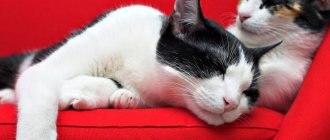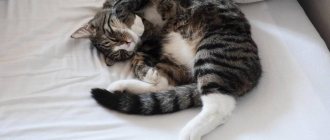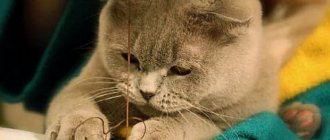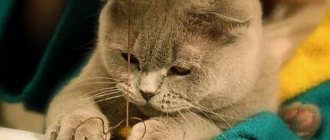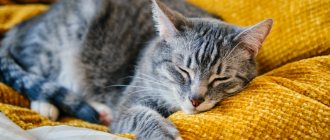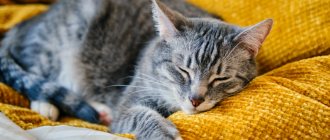Purring is usually associated with feline happiness and contentment. Therefore, when a cat suddenly stops purring, it can be a very worrying sign for the owner. However, there are many reasons why a cat stops purring.
Why doesn't my cat purr? Disease conditions such as laryngitis can cause a sudden change in vocalization, making it difficult for your cat to purr. Other factors that cause a cat to stop purring include age, anxiety and stress, clogged vocal cords, and injury. If left untreated, your cat may stop purring forever.
In many cases, when a cat stops purring, it is for a treatable reason. However, any changes in your cat's behavior or demeanor should be taken seriously as they are often signs of an underlying problem.
Why has my cat stopped purring?
According to Scientific American, most cat species produce vocalizations similar to purrs. In domestic cats, it is most noticeable when the animal is nursing kittens or responding to social contact, including stroking, petting, or feeding.
When a cat purrs, its body begins to produce serotonin. Serotonin is a hormone that regulates a cat's happiness or sadness. Cats with low levels of serotonin in their blood are more likely to suffer from depression.
A cat supplies itself with serotonin because it is either happy or sad. When she is happy, purring expresses this joy and signals that the cat is feeling comfortable and relaxed. If your cat is sad or hurt, purring will soothe the pain. Therefore, if the cat does not purr at all, most likely there is an underlying problem.
There are a surprising number of reasons why a cat might stop purring. Health problems are usually to blame, but behavioral problems can also be to blame. It's natural to feel worried when your pet stops purring, especially if he's always done it. But in many cases, the absence of purring is temporary or can be treated.
If you can't see any obvious reason why your cat isn't purring, it's best to seek professional help. In the meantime, here are the most common reasons why your cat has stopped purring:
Anxiety
Stress or anxiety can prevent your cat from purring. If a cat senses danger, its body reacts with fear, which can silence it. If you compare this reaction with the reaction of a person, it will be similar to a person becoming silent and refusing to speak because he is scared or nervous.
The problem is that the potential causes of stress and anxiety are varied. Anxiety can be caused by injury and illness, pain and injury. It can also be caused by separation anxiety.
This is especially common with cats that have been abandoned in the past. Cats that are attached to their owners sometimes have a hard time being separated from them and experience fear during their absence.
If your cat has lost the ability to purr, look for abnormal behavior that indicates something is wrong. Exaggerated, intrusive or aggressive behavior are signs that your cat is unhappy.
As older cats become calmer and calmer, their vocalizations become less frequent. Many cats meow and purr much less frequently.
It's simply part of a cat's natural lifespan, and it happens differently in different animals. Some geriatric cats even vocalize more. It is always best to monitor your older cat for changes in behavior or health.
Injuries
Cats tend to hide their suffering. If your pet has recently been injured or injured, he will hide and be as quiet as possible. This tactic was adopted by wild cats, who, if wounded, behaved as quietly as possible so that predatory animals could not detect them.
They're just getting old
Sometimes cats lose energy as they age. Instead, they prefer to use their energy for eating and playing. Even though they don't purr, older cats can be just as happy as younger ones. They simply may not have the energy or means to show you their appreciation and happiness as they used to.
Image Credit: Sleepy Cat, Unsplash
We recommend viewing
Why do cats change their sleeping places? Why do cats get in your face while you sleep? Why do cats act strange when you scratch the base of their tail?
Injured animals are vulnerable and more susceptible to attack. Feral cats find a secluded place and hide quietly from predators until they come to their senses and are healthy enough to recover and move on safely.
Domestic cats adopt this behavior to avoid being perceived as prey. Therefore, they may temporarily stop their purring until they recover from the injury. If you notice that your cat has stopped purring for an extended period of time due to an injury, it is probably time to take your cat to the vet if anything is slowing down the healing process.
Tumors or polyps
Like laryngitis, cancerous tumors of benign polyps in the throat and vocal cords can prevent a cat from vocalizing. This happens because they block the nasal passages and reduce the flow of air through the nostrils. This obstruction makes it difficult for your cat to breathe, let alone meow or purr.
Hoarseness, sneezing, coughing, or a significant change in the sound of the voice are symptoms of a blocked nose or throat and should be evaluated by a veterinarian.
Laryngitis
Laryngitis is an inflammation of the larynx that affects a cat's voice box or larynx. It is generally more common in older cats, but can also affect younger ones. Symptoms of laryngitis include a painful cough, harsh breathing, hoarseness, or absence of sounds. Laryngitis can also cause purring to stop altogether.
The vocal apparatus and larynx of a cat function in the same way as in humans. Air passing through the larynx causes the vocal cords to vibrate, producing sound. As described in the MSD Manual, fluid accumulation and swelling of the mucous membranes are often a key part of laryngitis. In severe cases, upper airway obstruction may occur. This is the most common reason why a cat stops purring if the animal is suffering from laryngitis.
The first noticeable sign of laryngitis is a dry, hard, short cough. Over time it becomes soft and moist, but can be very painful. Voice changes may occur, as well as noisy breathing and bad breath. Physically, a cat may stand with its head down and mouth open, indicating pain or distress.
Physiology of purring
First, let's figure out how and why cats make such sounds, which we call purring. Experts say that this is determined by a number of features, because only representatives of this family have this property .
1 version . Impulses from the brain transmit signals to the vocal cords, which cause their vibrational contractions. For us it is heard that the pet is purring. If the cat opens its mouth at this time, it will produce a normal “meow.”
Version 2 . Air flow movement. Scientists say that the ability of cats to purr as they inhale and exit is the result of the circulation of air entering the lungs.
Version 3 . A slightly implausible assumption, but it also has a place - cats can force the blood flow to circulate through large vessels so that a special vibration occurs in the skull. It is she who gives that sound.
It is noted that the sound vibration from a cat purring is a kind of training for both blood vessels and muscles. The furry sloth needs it so much.
Types of purring sounds in cats
It is clear that purring is a sign of a happy cat, but this is not always the case. Purring can also signal that your cat is stressed, sad, or in pain. An injured cat will purr to calm itself and turn to someone for comfort. The main types of purring are as follows:
contented purring
A cat that is happy makes a contented purr. This is when she feels most comfortable. A cat makes this sound when it is resting or in a relaxed state. Try not to disturb the cat during this period, as you may disturb its contented state.
Affectionate purr
It is an expression of affection and one of the main tools of communication. It is best described as the cat equivalent of a human smile.
Cats do not purr when alone and will purr in the presence of people to express happiness and show that they are not a threat. In return, the cat receives affection and attention.
Passive purring
If your cat has suffered trauma or injury, you may hear her purr passively—if she purrs at all. As described in the Library of Congress by M.D., M.D. Elisabeth von Muggenthaler, purring cats using low-frequency vibrations is believed to be a way of self-healing, as well as a way to strengthen and repair bones while providing natural pain relief.
What does a cat purr mean?
Experts believe that purring is a way for kittens and mothers to communicate. Because kittens are born blind and deaf, during the first weeks of their lives the vibration of their mother's purring gives them confidence and encourages them to nurse. Then, when kittens become adults, purring has other functions and meanings.
But here, since the mechanisms of purring have not yet been determined, the same goes for explaining its functions and meaning.
However, it has been observed and confirmed that purring is used by cats as a communication tool and is very effective in conveying a calming signal .
Signs your cat is stressed
Stress can be directly related to the fact that your cat has stopped purring. Usually the first sign is the cessation of purring, followed by other symptoms and behaviors that indicate underlying problems.
The problem is that cats are good at hiding pain or emotions because in the wild they would be easy targets for predators. However, stressed cats exhibit a number of common symptoms and behaviors that may indicate that something is wrong.
Stress in cats should be manageable and reduced as much as possible. If your cat experiences too much stress, she may become emotionally and physically unhealthy and may develop illnesses. Some cats also become aggressive, exhibiting unwanted behavior in the home that is difficult to control.
Finding out the cause of your cat's stress prevents a number of problems from getting worse. This will also help you understand why your cat has stopped purring and may help her find her lost voice. Some signs may be difficult to notice, so pay attention to the following:
Physical symptoms of stress
The most common physical symptoms of stress include:
- Diarrhea
- Vomit
- Excessive consumption of food or drink
- Sudden weight loss or gain when the cat eats non-food items such as plastic
- Lethargy or sleeping more than usual
- Dull or oily coat
- Bad, flaky skin
- Bald patches or red sores on the coat due to excessive grooming or reluctance to go to the toilet
- Painful urination with traces of blood
- Cat flu, which is often identified by a runny nose and eyes.
Symptoms may be more severe in cats with chronic illnesses. Stress can also cause recovery from illness to be slower than in a healthy cat, as stress affects the cat's immune system and can make it more difficult for a cat to fight off illness.
Behavioral symptoms of stress
The most common behavioral symptoms of stress include:
- Any significant changes in the cat's daily routine or behavior
- Aggressive behavior directed towards people or other animals
- Accidents all over the house
- Splashing urine on walls or furniture in the house
- Frequent meowing; constant need for attention
- Hides or hides itself in hard-to-reach places
- Lack of understanding of what is happening in the environment
- Nervousness - jumping at every sound or movement
- Reluctance to play
- Prolonged stay outside
- Refusal to go outside
- Excessive grooming, to the point where the skin becomes painful
- Shortness of breath or open mouth
- Excessive movement around the house
- Frequent head shaking
- Squat
- Flatten ears
- exaggerated swallowing
If any of the behaviors listed above seem out of character for your cat, even if they are subtle, it is best to find out the root cause.
How can I reduce my cat's stress?
Managing stress is essential to getting your cat to purr again, so try to figure out what is causing your cat's stress. Once you know this, you can take steps to help your cat feel comfortable again. These tips will also help you:
- Keep your cat healthy by scheduling regular checkups. Don't skip wellness visits and make sure basic treatments, such as flea treatments and nail trims, are completed. These treatments will help your cat feel comfortable.
- Set up many secluded places in the house where your cat can run if she is scared or anxious.
- Play with your cat and change her toys regularly to ensure adequate stimulation.
- Hide treats throughout the house so your cat can get a pleasant surprise.
- Keep the litter box clean at all times and place it in a quiet place where your pet can do its business in peace.
- If you have other animals, make sure they have separate areas where they can get away from each other if necessary.
- Provide access to fresh air.
- Always provide fresh food and water. Hungry and thirsty cats can become grouchy.
Do cats stop purring when they die?
If your cat's behavior changes, you should monitor her health and temperament for signs of pain or distress.
If your pet's behavior remains mostly the same, eating, drinking and going about his normal daily life, there is likely no cause for concern. Some cats naturally stop purring and can communicate in other ways. For example, a cat may stop purring, meowing more often or hitting its owner with its paw.
However, if your cat's mood or behavior changes, the problem may lie elsewhere. The most common signs of illness or disorder are lack of appetite, lethargy and low mood.
The cat may also hide frequently. If your cat exhibits any of these signs, then the lack of purring is most likely a symptom of a health problem. It's best to have it checked by a veterinarian.
The effect of a cat's purring on humans
While it is undeniable that a cat's purrs calm us down, calm us down and make us feel good, their effects don't stop there!
Indeed, cat purring has recently been recognized as having therapeutic benefits for men. This is what some call purr therapy.
In fact, a cat's purring can reduce stress, combat insomnia, and calm anxiety. Other research, for example, is currently exploring the power of purring on bones to speed up bone healing.
When is a Purring Therapy Session Reimbursed by Social Security?
How to make a cat purr?
If your cat is not a natural purr, there is little you can do to get her to start purring. Cats communicate in different ways and may express their emotions in other ways, such as meowing.
However, if you have heard your cat purr before but have noticed that she has stopped doing so recently, there are a few things you can try to encourage her to purr louder and more often. Try the following tips:
- Gently stroke the most pleasing areas for your cat - under the chin, behind the ears and at the base of the tail. Your cat may have a particularly sensitive area, so pet it.
- Hug your cat or lie next to her when she sleeps. Pet it gently when the animal is in its most relaxed state.
- If your cat likes to stretch, place a pillow, cushion, or other soft furnishings so she can stretch while you pet her.
- Talk softly to your cat while performing all of the above activities to encourage the cat to become comfortable and relax.
Even if your cat doesn't purr after you've done all the steps above, your pet will definitely enjoy it, and any form of affection will strengthen your bond.
